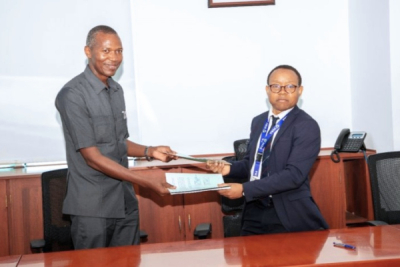The Dubai-based company said the investment will help bolster payment systems infrastructure and financial inclusion and contribute to the digital transformation undertaken by the Egyptian government.
Network International, a major player in digital commerce in the Middle East and Africa (MEA) region announced on Monday, August 28 an investment of EGP 1 billion ($32.3 million) to support Egypt's economic growth through innovative payment solutions.
According to the company's press release, a"significant portion" of the capital will be spent to buy, deploy, and maintain around 100,000 point-of-sale (POS) machines in several regions of Egypt. The rest will be devoted to the implementation and smooth operation of Network One, the company's state-of-the-art payments technology platform.
"This investment underscores our ongoing commitment to providing innovative payment solutions to Egyptian businesses. Our presence in the Egyptian economy spans more than two decades, during which we have served numerous banks and financial institutions," said Nandan Mer, CEO of Network International.
Network International's new investment in Egypt aligns with its government’s efforts to implement the country's national digital transformation strategy called "Digital Egypt 2030". The latter aims to "realize the digital economy through ICT, to ensure prosperity, freedom, and social equity for all".
Network International's presence in Egypt will significantly contribute to financial inclusion and GDP growth. The player strives to modernize financial technology to facilitate the transition from cash to digital payments.
Samira Njoya
Like Equatorial Guinea and Cameroon, who did it this year, Burkina Faso has digitized its visa.
Burkina Faso recently adopted the e-visa. The dedicated platform was launched on August 17, in Ouagadougou, the capital, by the Deputy Minister for Security, Mahamadou Sana.
Sana believes that the e-visa is a response to transnational crime and that it will help boost internal security by controlling migratory flows, and optimize the collection and management of government revenues.
The new e-visa platform, according to Aminata Zerbo-Sabané, Minister of Digital Transition, Post and Electronic Communications is a huge step in the ongoing digitization of the country’s public services. The platform is backed by the Burkina Faso Visa Security Project (PSV-BF).
"This platform is part of the government's drive to put digital technology at the heart of the overhaul of our administration," Zerbo-Sabané declared.
Travelers looking to secure a visa can simply do so by accessing the website www.visaburkina.bf using their email. Once connected, they will have to fill out a form, upload the necessary information and pay online, via a bank card.
The e-visa’s price varies depending on the number of days a visitor plans to stay in the country. It ranges from €51 for a 3-month single-entry tourist visa to €160 for a single-entry express visa.
Samira Njoya
We are in the digital economy era, and the impact of tech entrepreneurship on wealth and job creation keeps growing in Africa. However, African innovators still face many challenges, and encouraging local talent and promoting access to certain resources is becoming more and more urgent.
The Tanzania Communications Regulatory Authority (TCRA) and the Tanzania Commission for Science and Technology (COSTECH) recently signed a partnership agreement to provide free communications resources to emerging ICT companies. The move aims to foster an environment that is conducive to digital innovation and allows these companies to thrive.
"The collaborative effort aims to nurture the country's thriving digital innovation landscape, ensuring that start-ups have the tools they need to thrive and contribute positively to society through their technological advances," said TCRA CEO Dr Jabiri Bakari (pictured, right).
"The distribution of these resources makes it possible to offer high-speed Internet services, an important factor in the digital economy," he added.
Two months ago, the TCRA allocated resources to four innovative startups to enable them to submit their ideas to COSTECH for further development. The move also contributes to the Tanzanian government's ambition to provide 80% of the population access to high-speed Internet by 2025, consequently fostering innovation in areas such as entrepreneurship, agriculture, and transport.
Support from TCRA and COSTECH will enable Tanzanian startups to communicate their projects free of charge. Among other things, TCRA provides numbering resources, frequency spectrum, zip codes, residential addresses and mobile money services.
Samira Njoya
The solution was launched to particularly allow users to get their food and groceries delivered anytime, even at night time as there were no night-time delivery services at the time.
Noofy is a mobile application developed by an Algerian start-up. It enables users to have food and groceries delivered to their doorsteps. On its website, the startup behind the app explains: “When Noofy founder and CEO Nacer Eddine Gacem returned to Algiers in 2022, he discovered a city full of excellent restaurants open at night, but was astonished that there was no option for food and grocery delivery as well as tobacco delivery at night. He made it his personal mission to bring the best local night store work right to people's doorsteps.”
In line with its commitment, the startup has developed a mobile application, accessible for Android and iOS devices. Through that app, a user can create an account, with just a phone number, and check the restaurants and stores listed.
Among other things, users can buy local or western foods, and stock up on groceries and other goods from convenience stores, specialty stores, or supermarkets.
To further simplify the process, Noofy requires users to enter their geographic location before anything. Based on that location, the app will suggest nearby restaurants or stores to reduce delivery time.
Apart from food and grocery, Noofy also delivers tobacco and medicines on demand. Its delivery drivers ride bicycles to reduce the startup’s environmental impacts.
The idea is successful since, according to Play Store data, in about one year of existence, the Noofy Android app has been downloaded more than a thousand times. Nevertheless, the startup, which currently operates in Algiers, seeks to expand to other large cities including Oran, Constantine, Setif, and Tlemcen.
Adoni Conrad Quenum
The most populous country in Africa does not want to be left behind when it comes to new tech tools. The federal government is striving to leverage assets such as its youth to become a leader in AI.
Early this week, the Minister of Digital Economy, Bosun Tijani (pictured), made a post on X calling on all top researchers from the continent and abroad to help make this ambition a reality. The goal is to build an AI-powered development strategy. “We are curating a list of the top researchers of Nigerian descent from all over the world to join us in co-creating a National AI Strategy. The strategy will help shape our approach to building innovative tech solutions to our most pressing national problems,” the authority said.
AI has become, according to the FG, a multipurpose technology that transforms production and service delivery and has the potential to significantly stimulate economic growth and social development. Nigeria believes that by 2030, this technology could contribute up to $15.7 trillion to the global economy with $3 trillion coming from increased productivity and $9.1 trillion from new products and services.
With its national AI strategy, the country hopes to position itself as a leader on the continent in the next few years and tap into the benefits of this segment. Better still, Nigeria wants to give its tech environment a new face and unleash more effective and impactful tech innovations.
Samira Njoya
After several years working for major UK and South African companies, he founded a digital health startup in his home country. He is supported by Founders Factory Africa and Google for Startups.
Njabulo Skhosana (photo) is a South African entrepreneur and versatile professional. He co-founded HealthDart, a digital health startup of which he is the CEO.
The tech entrepreneur holds a bachelor's in pharmacology from the University of Liverpool (2008), a master's in international business from the University of Sheffield (2010), and a master's in international development, public policy and management from the University of Manchester (2013).
His healthech startup, founded in 2021, aims to make healthcare accessible and affordable for everyone. Its eponymous platform makes it easy for South Africans to find nearby nurses, doctors, and pharmacies to get the care they need. The startup aims to develop a leading healthcare platform that sets the standards for quality in the digital age. For that purpose, it offers affordable hospitalization plans to ensure comprehensive coverage in case of unforeseen medical emergencies.
Backed by Founders Factory Africa, a technology investor that supports pan-African early-stage founders, the company has delivered over 2,000 medicines and carried out more than 1,500 medical consultations. It was selected as one of 25 African start-ups for the Google for Startups Black Founders Fund 2023.
"[...] Our goal and current efforts revolve around streamlining how patients access healthcare, particularly primary healthcare, anchored around the pharmacy as the future of integrated primary healthcare," explained Njabulo Skhosana in August 2023.
The latter entered the professional world, in 2008, by joining the food and beverage company HJ Heinz as a quality control chemist. In 2009, he worked, as a claims administrator, for financial and legal firm Fairpoint. In 2011, he was hired by health insurance company Bupa as a healthcare service delivery adviser. In 2013, Deloitte recruited him as a manager of strategy and operations. Three years later, he became Chief of Staff to the CEO of Discovery Health, the healthcare arm of Discovery Ltd. He held this position until 2020.
Melchior Koba
After 19 years outside his native Côte d’Ivoire, Zaza Gnahore, the founder of Djoloo decided to return home to reconnect to his culture and popularize African culture across the world. Through his online platform, he is doing just that.
Djoloo is an e-commerce platform developed by an Ivorian start-up. It enables users to purchase items from artists and artisans who showcase African culture.
On the platform, unregistered users can browse the online stores and the various items on sale. The items include books, games, gift packaging, and accessories, as well as clothing for men, women, and children among other things.
Apart from Côte d'Ivoire, the products on sale on the platform come from several African countries, including Senegal, Côte d'Ivoire, Mali, Benin, Cameroon, Tunisia and Morocco. To place an order, a user will need to create an account by entering the necessary information.
Djoloo does not offer delivery services but the orders can be shipped to the address indicated by buyers. Delivery time usually ranges between two and four days, unless stated otherwise on the product description page or during order validation.
The startup explains that when a delivery fails, the carrier hired to deliver the order will deliver the products to a neighbor/nearby address or collection point.
In addition to online sales, the platform has a blog on which it showcases African artisans and artists and their products. The blog features several articles telling the success stories of the owners of various African brands.
Adoni Conrad Quenum
Kenya: SwahiliBox encourages collaboration, learning, and the development of technological solutions
Through its technology-focused programs, training, and services, SwahiliBox stimulates local innovation and helps address the technological and social challenges facing the Kenyan and wider East African community.
Based in Mombasa, Kenya, SwahiliBox is a space dedicated to technology co-creation. It aims to empower people by stimulating innovation through networking, training, mentoring, and cooperation. The space brings together a diverse set of skills to share knowledge, concepts, and impactful solutions to local and global challenges.
Headed by Ahmed Mohamed Maawy, a seasoned tech professional and entrepreneur, SwahiliBox promotes creative thinking by creating a framework conducive to the emergence of innovative ideas and the design of innovative solutions. It organizes incubation programs for online entrepreneurs and also sets up acceleration programs during which it offers funding opportunities and strategic advice to start-ups wishing to expand.
Its comprehensive training courses cover a wide range of both technological and business topics. They equip learners with practical skills, sectoral expertise, and in-depth knowledge, enabling them to stand out in today's competitive environment.
In addition to its training, incubation, and acceleration initiatives, SwahiliBox also offers its software development and game design skills to companies. Its team has in-depth expertise in creating tailor-made solutions perfectly suited to the specific needs of every business.
The incubation center also provides data analysis solutions to enable companies to gain valuable business insights, make the right decisions, and optimize their processes for sustainable growth. It also offers UI/UX design and digital marketing services.
To date, SwahiliBox has completed 129 projects and satisfied 158 customers. Having built a community of 1,800 members, it has signed partnerships with several institutions and organizations, including TechBridge Invest, Ushahidi, The Indigo Trust, Seacom, iHub, Camara Education, X-TEAM, and Sote Hub.
Melchior Koba
The digital revolution emerges as a potent catalyst for development and progress worldwide. Nevertheless, it also unveils vulnerabilities that may present obstacles to advancement.
Last week, the cybercriminal group Snatch claimed a cyberattack on the South African Department of Defence (DoD). The group was said to have acquired 1.6 terabytes of sensitive data including military contracts, internal call signs, and personal data including President Cyril Ramaphosa's contact number.
The declaration was qualified as "fake news" by South African National Defence Force (SANDF) spokesperson Brigadier General Andries Mahapa, on Friday 25 August. It has however raised concerns about national security and the country's digital infrastructure.
While the presidency hasn't commented on the matter, some cybersecurity experts have stressed again the need to strengthen cybersecurity protocols to protect the digital transformation of the country. This breach highlights the growing threat of cyberattacks on critical government institutions, emphasizing the importance of robust cybersecurity practices.
In its "Global Cybersecurity Outlook 2022" report, the World Economic Forum (WEF) estimates that Ransomware attacks will be the main threat to the digital systems of organizations and administrations.
The report also points out that "Ransomware attacks saw a significant increase in the first six months of 2021, with global attack volume increasing by 151%. The United States Federal Bureau of Investigation (FBI) has warned that there are now 100 different strains of ransomware in circulation globally. It is unlikely that this issue will diminish in pace or severity any time soon."
Hikmatu Bilali
MedsToGo was launched by Ebrahim Ally, a South African finance professional, to facilitate the supply of pharmaceuticals in major South African cities.
MedsToGo is a business-to-customer e-health solution developed by a South African start-up, launched in 2016. It allows users to purchase prescription drugs, health items, vitamins, and baby care products.
Through its mobile (Android and iOS) apps, a user can create an account to access its services. For the account, the user needs the following information: name, email address, telephone number, and a secure password among other things. To place an order, the user must click on the "Orders" tab, and then specify whether the drugs and products are prescribed or self-prescribed. Once this step is completed, the user can access the virtual pharmacy, select the products needed, and finalize the purchase.
From Monday to Saturday, orders are delivered the same day when placed before noon. If not, they are delivered the following day. It should be noted that MedsToGo partners with numerous pharmacies in various parts of the country to facilitate the supply of pharmaceutical products.
In addition to this service, it integrates a messaging feature that enables messages to be sent to the pharmacist when needed. Among other things, it can help readjust the dosage of a patient's medication, or change it if the patient's condition is not improving.
For the time being, the startup wants to sustain its growth in the domestic market before considering an international expansion. Since its launch, the MedsToGo Android app has been downloaded over a thousand times.
Adoni Conrad Quenum
More...
The tech entrepreneur launched his startup, BezoMoney, while going through MEST Africa’s support program. Through the said startup, he provides digital financial products and services to the youth and unbanked individuals.
Ghanaian-born Mubarak Sumaila (photo) is the co-founder and CEO of start-up BezoMoney. A graduate of the University for Development Studies, where he earned a BSc in Biotechnology in 2017, he launched BezoMoney, two years later, while he was taking part in MEST Africa's startup training program.
"There are a lot of people in the informal sector in Africa and hardly do their lives improve in any way from year to year. Through our research, we realized that this is a result of their limited access to formal financial services which stems from their inability to build verifiable credit histories even though they save and access credit through informal financial schemes. BezoMoney exists to change that," the tech entrepreneur explains.
BezoMoney provides a social savings platform, Bezo, to help low-income populations easily save money and access significant capital through collective savings. It also offers BezoSmart Series, a financial education platform that provides customers with practical information on how to manage and improve their finances. The education platform covers a wide range of financial topics, from savings to investments. It offers a podcast, a financial education program, events, and meetings.
BezoMoney is one of the startups selected for the Google for Startups' Black Founders Fund 2023 program. Its CEO is also one of the beneficiaries of the Techstars Accelerator 2023. He is also a 2022 Halcyon Incubator Fellow and a member of the alumni steering committee of Summit, a global community of entrepreneurs, academics, athletes, and personalities of all kinds.
A former intern (2016) at Lancet Technologies, a pathology laboratory operating throughout South Africa, he worked between 2017 and 2019 as the Accra office manager of Startup Grind, a global startup community. In 2020, he became a podcaster at A Tribe called VC, an online media outlet that aims to bridge the information gap between African start-ups and venture capitalists. In 2021, he worked as a digital product manager at Digital Product School, a training program set up by the German company UnternehmerTUM.
Melchior Koba
Zanzibar started its digital transformation journey a few months ago. All sectors are undergoing the process; this includes payment systems, which play a crucial role in digital inclusion.
MasterCard recently committed to supporting the digital transformation ambitions of the government of Zanzibar, an autonomous administrative region of Tanzania. Last Tuesday, the the US company inked a memorandum of understanding (MOU) with the Zanzibar e-Government Agency (eGAZ), in this framework.
Under their partnership, MasterCard will provide technical support and its expertise to Zanzibar, over three years. According to the payment giant, this includes setting up a digital transformation team, collaborating with the ZanMalipo government payment portal to enable digital payments, and launching two million government cards for better access to services and tourism.
“This collaboration confirms our commitment to leveraging innovative technologies to improve service delivery. We believe that by working with MasterCard, a trusted partner, we can significantly accelerate the realization of our digital strategy and provide invaluable benefits to our citizens,” said Said Seif Said, Director General of eGAZ.
The agreement, signed during the launch of Zanzibar’s digital government strategy (2023-2027), aligns perfectly with the island's digital transformation objectives outlined in its master plan and digital economy roadmap.
The collaboration builds on MasterCard’s global experience in promoting digital transformation and facilitating financial and digital inclusion. It will, ultimately, foster an environment conducive to a pan-African digital economy, and stimulate innovation, trade, and investment in the United Republic of Tanzania and the region as a whole.
Samira Njoya
After much debate about the TikTok application, the Kenyan government has finally made up its mind. Unlike other African countries, the video-sharing app will not be suspended in the country.
TikTok recently committed to collaborating with Kenyan authorities to better control its content in the country. Kenyan President William Ruto made the announcement last Thursday, August 24, after a virtual meeting with TikTok CEO, Shou Zi Chew, who also agreed to open an office in Kenya to coordinate its operations in the region.
Kenya will work with the short-form video hosting service TikTok in reviewing and monitoring its content to ensure that it adheres to the agreed community guidelines and standards. It is our commitment that we bring up our children in the right environment.
— William Samoei Ruto, PhD (@WilliamsRuto) August 24, 2023
During a virtual… pic.twitter.com/ua1X8oL1sG
“Kenya will now work with the short video hosting service TikTok to review and monitor its content to ensure it adheres to the agreed community guidelines and standards. This new development means that inappropriate or offensive content will be removed from the platform,” said Ruto.
Barely 10 days before the announcement, Kenyan lawmakers received a petition from Bob Ndolo, a Kenyan businessman, highlighting the sharing of inappropriate content on TikTok and the collection of user data by its Chinese company. The parliament had decided to investigate the platform’s usage in Kenya and said it would decide in the following two months.
Earlier last week, Kenya’s neighbor Somalia banned TikTok, Telegram, and 1XBet, a betting platform. In a statement released on August 29, Somalia’s government blamed the platform of spreading misinformation and content that is harmful to national interests.
TikTok, which has more than one billion active users worldwide, is also suspended in Senegal, with authorities claiming that the platform is used to spread hateful and subversive messages that threaten the country's stability.
Samira Njoya
As part of efforts to develop its digital economy, Zambia has been partnering with various States that share its ambition.
Zambia and Malawi recently teamed up to reduce the costs of broadband connectivity in both countries. The two sides inked last week two major agreements in this framework. The first was between Malawi’s Ministry of Information and Digitization and Zambia’s Ministry of Technology and Sciences. The second was between the Malawi Electricity Supply Corporation (Escom) and Fibercom, a Zambian ISP.
Escom Malawi and Fibercom will, via their optical fiber cables, establish a diplomatic data corridor as part of their deal. This corridor will create an internet pathway through Zambia.
“The agreement on the diplomatic data corridor signed today lays the foundation for such connectivity to meet the communication needs of current and future generations. Escom, as the implementing agency on behalf of the Malawi government, is committed and ready to provide available, reliable, and affordable digital services,” said Escom CEO Kamkwanda Kumwenda.
The two agreements were signed in Lilongwe, Malawi. For Malawi, they will contribute to its ambition to achieve full digitization by 2063, and for Zambia, they are a major milestone towards its goals for accelerating ICT and Telecoms development by 2030.
Also, the partnership will help lower the cost of data, thus boosting access to Internet and consequently stimulating the partnering economies.
According to recent data from the Zambian Information and Communications Technology Authority (ZICTA), Zambia has 20.2 million mobile phone users, and 10.4 million internet users. As for Malawi, it had 5.04 million internet users at the beginning of this year, according to DataReportal. By 2026, the country seeks to have 80% of its population have access to the internet, against only 14% now. It also seeks to raise the mobile penetration rate from 51% to 80% over the same period.
Samira Njoya















